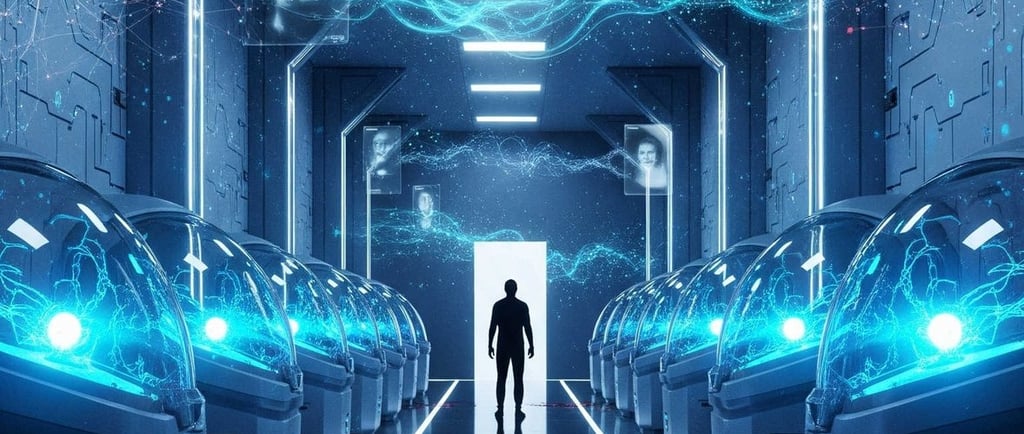The Neuroscience of Reading Thrillers: Why Your Brain Craves Suspense
Your brain can't tell the difference between fictional danger and real threat. When reading thrillers, your amygdala fires, stress hormones flood your system, and dopamine rewards every plot twist. This isn't just entertainment—it's consciousness modification. Stories literally rewire neural pathways, enhance empathy, and build psychological resilience. But if narratives can hack your brain without awareness, who controls the stories shaping your mind? Discover the neuroscience behind your thriller addiction and why your consciousness is the final frontier.
NEUROSCIENCE
Ana Sage
6 min read


Ever wonder why you can't put down a good thriller? Why your heart races during chase scenes even though you're safely curled up on your couch? The answer lies in the same neural pathways I explored while writing Recallen: Entry Wound—and the science is more fascinating than fiction.
Your Brain on Suspense
When you read about Thomas Bell waking up in that blood-soaked alley, your brain doesn't distinguish between fictional danger and real threat. Neuroscientists have discovered that reading activates the same neural networks involved in actually experiencing events.
The Amygdala Response: This almond-shaped structure in your brain triggers fight-or-flight responses whether you're facing a real attacker or reading about one. Your pulse quickens, your breathing shallows, stress hormones flood your system—all from words on a page.
Mirror Neurons: These specialized cells fire both when you perform an action and when you observe someone else performing it. When Thomas runs through hospital corridors, your motor cortex lights up as if you're running too. This neurological mirroring is why good thrillers feel so visceral.
The Default Mode Network: This brain network, active during rest and introspection, gets hijacked by compelling narratives. Instead of wandering to grocery lists or work stress, your mind becomes completely absorbed in the fictional world.
The Neurotransmitter Cocktail
Reading thrillers triggers a complex chemical cascade that's essentially a legal high:
Dopamine: Released during moments of anticipation and discovery. Every plot twist, every answered question, every "aha!" moment floods your brain with this pleasure chemical. It's why you keep turning pages even when you should be sleeping.
Norepinephrine: This neurotransmitter heightens attention and arousal. It's why you can read for hours without noticing time passing, why the outside world fades away when you're deep in a good book.
Cortisol: Yes, the stress hormone. Moderate levels actually enhance memory formation and focus. This is why you remember thriller plots more vividly than other genres—your brain treated the fictional stress as real, creating stronger neural pathways.
Oxytocin: The bonding hormone released when you connect with characters. It's why readers form genuine emotional relationships with fictional people, why you genuinely worry about Thomas Bell's fractured identity.
The Suspension of Disbelief Circuit
The most fascinating discovery involves how your brain handles fictional narratives. Researchers have identified a "narrative circuit" that temporarily suppresses your critical thinking functions, allowing you to accept impossible premises.
When you read about memory modification technology in Recallen, your brain literally turns down its skepticism centers. This neurological generosity is an evolutionary adaptation—stories have always been how humans share survival information, so we're wired to absorb narratives as if they were real experiences.
Why Thrillers Train Your Brain
Reading suspenseful fiction isn't just entertainment—it's cognitive exercise:
Enhanced Empathy: Following complex characters through moral dilemmas strengthens your ability to understand others' perspectives. The same neural networks involved in reading about Eliya Voss's ethical struggles activate when you face real-world moral decisions.
Improved Problem-Solving: Thrillers present mysteries that engage your pattern-recognition systems. Your brain practices connecting clues, predicting outcomes, and revising theories—skills that transfer to real-life challenges.
Stress Inoculation: Experiencing fictional danger in a safe environment builds psychological resilience. It's like a vaccine for anxiety—controlled exposure that strengthens your emotional immune system.
Memory Enhancement: The emotional arousal triggered by suspense creates stronger memory formation. This is why you remember thriller plots years later while forgetting other books within weeks.
The Neuroscience Behind Recallen's Structure
When I structured Entry Wound, I deliberately exploited these neural vulnerabilities:
Cascade Events: Thomas's memory episodes mirror how real brains actually recall traumatic experiences—in fragments, out of sequence, with emotional intensity that overwhelms linear thinking.
Identity Confusion: The uncertainty about which memories belong to Thomas versus Jonas activates the same neural networks involved in actual identity formation. Your brain works overtime trying to resolve the cognitive dissonance.
Technological Anxiety: The medical/technological settings trigger modern fears about losing control to systems we don't understand. This activates ancient survival circuits while engaging contemporary anxieties.
The Dark Side of Neural Hijacking
Understanding how brains respond to narratives raises ethical questions. If stories can literally rewire neural pathways, what responsibility do writers have?
Addiction Potential: The neurochemical rewards of suspenseful reading can become compulsive. Some readers develop tolerance, needing increasingly intense stimulation to achieve the same dopamine high.
Reality Distortion: Vivid fictional experiences can interfere with memory formation. Heavy thriller readers sometimes have difficulty distinguishing between events they experienced and events they read about.
Emotional Manipulation: Writers who understand neuroscience can craft narratives that bypass rational thought, potentially influencing beliefs and behaviors without readers realizing it.
Reading as Consciousness Hacking
In researching Project Mnemosyne, I realized that books are already a form of consciousness modification. Every story you read literally changes your brain structure, creates new neural pathways, and influences future thought patterns.
The difference between reading and the fictional memory modification in Recallen is consent. You choose to open a book, knowing it will change how you think and feel. The characters in my novel had no such choice.
The Future of Narrative Neuroscience
As brain imaging technology advances, we're learning more about how stories affect consciousness:
Personalized Narratives: Future books might adapt in real-time based on your neural responses, optimizing emotional impact for individual brains.
Therapeutic Fiction: Doctors are already prescribing specific books to treat depression, anxiety, and PTSD. Stories could become precision medicine for the mind.
Neural Enhancement: What if reading certain narratives could strengthen specific cognitive abilities? Books might become tools for upgrading human consciousness.
Why I Write About Memory
The more I learn about how brains process narratives, the more urgent the questions in Recallen become. If stories can modify consciousness, who controls the stories? If fictional experiences create real neural changes, what constitutes authentic identity?
Thomas Bell's journey isn't just science fiction—it's a metaphor for what happens every time you open a book. The only difference is awareness.
Protect Your Neural Sovereignty
Understanding how your brain responds to narratives puts you back in control:
Choose Consciously: Select books that align with who you want to become, not just what feels good in the moment.
Take Breaks: Allow your brain time to process and integrate fictional experiences instead of binge-reading.
Stay Aware: Notice how different genres affect your mood, thoughts, and worldview.
Question Everything: Even the most compelling narrative is someone else's construction of reality.
Your consciousness is the final frontier. Choose your stories wisely.
________________________________________
Have you noticed how different books affect your thinking patterns? Do thrillers change how you perceive risk in real life?
"Every story you read rewrites your brain. Choose your narratives wisely." —Ana Sage
________________________________________
Additional Reading Sources
Neuroscience of Reading and Narrative Processing
Berns, G. S., et al. (2013). "Short- and long-term effects of a novel on connectivity in the brain." Brain Connectivity, 3(6), 590-600.
Mar, R. A. (2011). "The neural bases of social cognition and story comprehension." Annual Review of Psychology, 62, 103-134.
Speer, N. K., et al. (2009). "Reading stories activates neural representations of visual and motor experiences." Psychological Science, 20(8), 989-999.
Yarkoni, T., et al. (2008). "Neural substrates of narrative comprehension and memory." NeuroImage, 41(4), 1408-1425.
Mirror Neurons and Empathy
Rizzolatti, G., & Craighero, L. (2004). "The mirror-neuron system." Annual Review of Neuroscience, 27, 169-192.
Gallese, V. (2003). "The roots of empathy: The shared manifold hypothesis and the neural basis of intersubjectivity." Psychopathology, 36(4), 171-180.
Default Mode Network
Buckner, R. L., et al. (2008). "The brain's default network: Anatomy, function, and relevance to disease." Annals of the New York Academy of Sciences, 1124, 1-38.
Mason, M. F., et al. (2007). "Wandering minds: The default network and stimulus-independent thought." Science, 315(5810), 393-395.
Neurotransmitters and Reading
Zak, P. J. (2015). "Why inspiring stories make us react: The neuroscience of narrative." Cerebrum, 2015, cer-02-15.
Paul, A. M. (2012). "Your brain on fiction." New York Times (March 17, 2012).
Books and General Sources
Gottschall, J. (2012). The Storytelling Animal: How Stories Make Us Human. Houghton Mifflin Harcourt.
Boyd, B. (2009). On the Origin of Stories: Evolution, Cognition, and Fiction. Harvard University Press.
Wolf, M. (2007). Proust and the Squid: The Story and Science of Reading. HarperCollins.
Zunshine, L. (2006). Why We Read Fiction: Theory of Mind and the Novel. Ohio State University Press.
Memory and Stress Hormones
McGaugh, J. L. (2000). "Memory--a century of consolidation." Science, 287(5451), 248-251.
Cahill, L., & McGaugh, J. L. (1998). "Mechanisms of emotional arousal and lasting declarative memory." Trends in Neurosciences, 21(7), 294-299.
Bibliotherapy and Therapeutic Reading
Billington, J. (2011). "'A literature-based intervention for older people living with dementia." Perspectives in Public Health, 131(4), 165-169.
Dowrick, C., et al. (2012). "Self-management of depression: A systematic review." Patient Education and Counseling, 91(3), 275-288.
Research Institutions and Centers
Center for Reading and Language Research (Tufts University)
Haskins Laboratories (Yale University/University of Connecticut)
Max Planck Institute for Psycholinguistics
Center for the Neural Basis of Cognition (Carnegie Mellon/University of Pittsburgh)
Explore
Dive into the world of neurothrillers.
Connect
subscribe
© 2025. All rights reserved.
